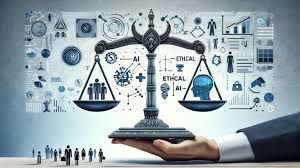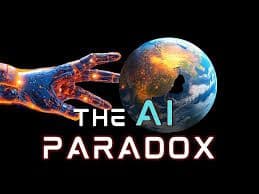Introduction
Artificial Intelligence (AI) has become an integral part of our daily lives, driving innovations in healthcare, finance, automation, and beyond. However, with its rapid advancements, AI presents a paradox—while it promises efficiency and intelligence, it also raises ethical concerns and risks. Can we harness AI for the greater good while mitigating its potential dangers?
This blog explores the paradox of AI, its benefits, challenges, and the need for responsible innovation.
What is the Paradox of AI?
AI’s paradox lies in its conflicting nature—it can be both a force for progress and a source of unforeseen challenges. On one hand, AI enhances efficiency, automates repetitive tasks, and provides data-driven insights. On the other hand, it poses risks such as job displacement, bias in decision-making, and privacy concerns.
The fundamental question remains: How do we balance AI’s potential with its unintended consequences?
The Double-Edged Sword of AI Advancements
AI as a Catalyst for Growth
- AI-driven automation reduces human effort and improves productivity.
- Machine learning algorithms help in predictive analytics, revolutionizing industries like healthcare and finance.
- AI in customer service enhances user experience through AI chatbots and virtual assistants.
The Risks and Ethical Concerns
- Job Displacement: AI automation replaces traditional jobs, leading to economic disruptions.
- Bias in AI Algorithms: AI systems may inherit biases from training data, leading to unfair or discriminatory outcomes.
- Privacy Issues: AI-powered surveillance and data collection concern user privacy and security.

AI’s Ethical and Moral Challenges
Defining Ethical AI Boundaries
AI systems make decisions that directly impact people’s lives, raising complex ethical questions. Business leaders must define clear boundaries for AI development, ensuring that systems are designed with transparency, accountability, and fairness.
The stakes are high—missteps could lead to biased algorithms, loss of personal freedoms, and widespread mistrust. Implementing ethical guidelines throughout the AI development lifecycle is crucial to maintaining public confidence in AI technologies.
AI Accountability and Responsibility
One of the biggest concerns in AI is accountability—who is responsible when an AI system makes a mistake? As AI systems become more autonomous, ensuring accountability becomes more challenging. A human-in-the-loop strategy is necessary, where human oversight is involved in AI decision-making. This approach helps ensure that AI remains a tool for progress rather than an unchecked force that could lead to unintended consequences.
Ethical Use of Data
Data is the foundation of AI, but its ethical use is critical. Organizations must:
- Obtain informed consent from data subjects before collecting and using personal information.
- Implement ethical data policies that prioritize transparency and fairness.
- Ensure compliance with privacy regulations to protect individual rights. By prioritizing ethical data practices, AI can serve all of humanity equitably, ensuring that its benefits do not come at the cost of individual privacy and freedoms.
Balancing Innovation with Responsible AI

To maximize AI’s benefits while minimizing its risks, organizations and governments must take proactive steps:
- AI Regulation & Policies: Implementing strict AI regulations can prevent misuse and ensure fairness.
- Ethical AI Development: Companies should prioritize transparency, inclusivity, and fairness in AI model training.
- AI & Human Collaboration: Instead of replacing jobs, AI should complement human skills, fostering a hybrid work environment.
Global Ethical AI Frameworks
International organizations have made efforts to create ethical AI frameworks, such as:
- UNESCO’s Recommendation on the Ethics of Artificial Intelligence
- IEEE’s Global Initiative on Ethics of Autonomous and Intelligent Systems
However, these frameworks are largely voluntary and lack enforceability, meaning ethical AI development still depends on proactive corporate responsibility and government oversight.
Future of AI: Risks and Opportunities
The future of AI is promising but requires careful navigation. Artificial General Intelligence (AGI) could push AI beyond human capabilities, making ethical considerations even more critical.
If managed correctly, AI can revolutionize industries such as:
- Healthcare – AI-powered diagnostics and personalized treatments.
- Climate Change – AI-driven solutions for sustainability.
- Education – Intelligent tutoring systems and personalized learning experiences.
However, if left unchecked, AI could lead to unintended consequences, such as a loss of control over autonomous systems or ethical breaches in decision-making.
Conclusion
The paradox of AI highlights the fine line between technological advancement and ethical responsibility. While AI continues to evolve, it is imperative to ensure that it serves humanity’s best interests rather than becoming a threat. By fostering ethical AI practices, strong regulations, and human-AI collaboration, we can harness AI’s potential responsibly and shape a future where AI works for all.
Are You Ready to Adopt AI Responsibly? AI is transforming industries—don’t be left behind! Whether you're a business leader, developer, or policymaker, embracing ethical AI is crucial for sustainable growth. Join the movement for responsible AI today!
Contact us at Autex Innovation to learn how AI can benefit your business—ethically and efficiently!
